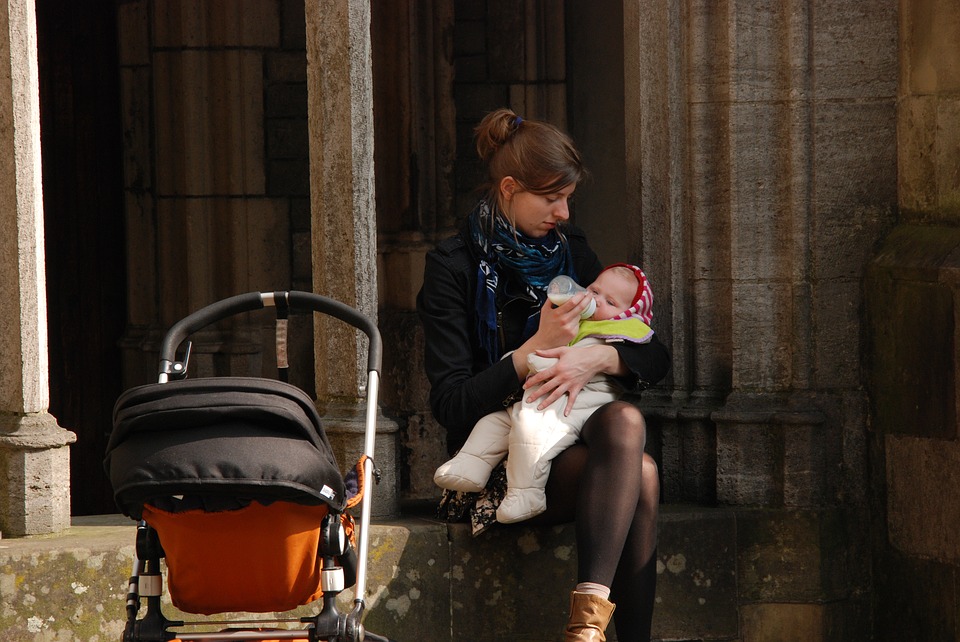
We are all familiar with the strange sensation of having the hiccups. While it can be annoying for adults to have a bout of hiccups, it is completely normal for newborn babies. Infants up to a year old may get the hiccups several times a day and can even do it in the womb!
Hiccups are caused by a spasm of the diaphragm, a large muscle located under your lungs and above your stomach. In infants, the muscle and surrounding area are still developing, so it’s common for spasms to occur and trigger the hiccups. The most usual cause is feeding too quickly, which can cause the stomach to swell with food or excess air, irritating the diaphragm. Sudden changes of food temperature can also stimulate hiccups.
While hiccups are to be expected in infants, there are a few things you can do to prevent or stop bouts:
Table of Contents
How to Stop Your Baby’s Hiccups
1. Feed Your Baby
If your baby is having a fit of the hiccups, feeding via breast or bottle may help to stop it. The sucking motion can relax the diaphragm and stop the hiccups, with the bonus of giving you baby food at the same time.
2. Burp Your Baby
Hiccups can be caused by excess air causing the stomach to distend and press against the diaphragm. Try burping you baby can help to release any air that may be trapped in your baby’s tummy.
3. Burp Your Baby During Feeding
Try take a break during feeding to burp your baby. This eases digestion and gives a chance for excess gas to be released before it irritates your baby’s diaphragm.
4. Try Use a Pacifier
Using the same principle as feeding your baby to stop hiccups, the action of sucking on a pacifier can relax and ‘reset’ the diaphragm. Try giving your baby a pacifier to see if that helps.
5. Change Baby’s Positions
Try moving your baby into an upright position can help relieve pressure on its diaphragm. An upright seated position allows gas to float to the top of your baby’s stomach, which can later be released by burping. Seating you baby in an upright position during feeding can also prevent hiccups by reducing the amount of air which settles into your baby’s stomach.
6. Feed Your Baby Before They Get Too Hungry
If your baby is hungry it may eat too quickly or suck in air while feeding. Both of these things can trigger hiccups, so try feeding your baby before they start to get really hungry can prevent future fits. You may wish to set a schedule and feed your baby before it starts to cry, if you think your baby is suffering from excessive hiccups.
7. Feed Your Baby Small, Regular Amounts
Try frequent feedings will stop your baby from becoming too hungry and sucking down air and milk too quickly. Smaller amounts will also prevent your baby’s stomach becoming too full at one time and making pressing against the diaphragm.
8. Try Gripe Water
If your baby seems to hiccupping more than you would like, you can try giving it a gripe water solution. While its efficacy isn’t proven, this is a mixture of herbs including ginger, fennel, cinnamon and others. The ingredients are intended to gently aid digestion and may thereby assist with getting rid of hiccups. Choose a trusted brand and be careful to avoid brands which contain sugar or alcohol.
Summary
If the hiccups are excessive or if your baby seems upset by them, it may be a sign that something else is going on. If you suspect the hiccups are a symptom of something else, such as gastroesophageal reflux, take your baby to their paediatrician.
If the hiccups seem normal, the final thing you can do is to just relax and let it pass. Hiccups often bother the parents more than the baby; if your baby doesn’t seem bothered, there’s probably nothing to worry about. Just wait them out and they will eventually go away on their own.
